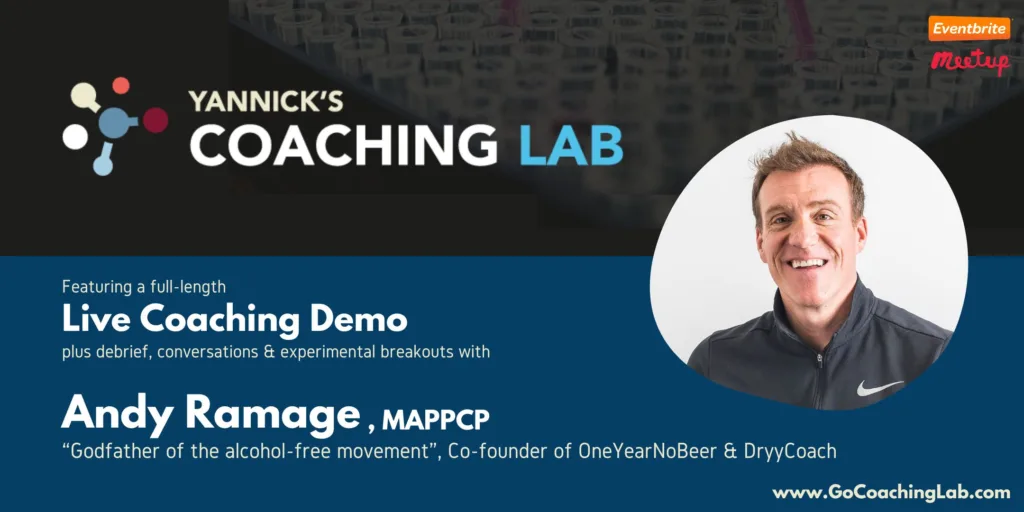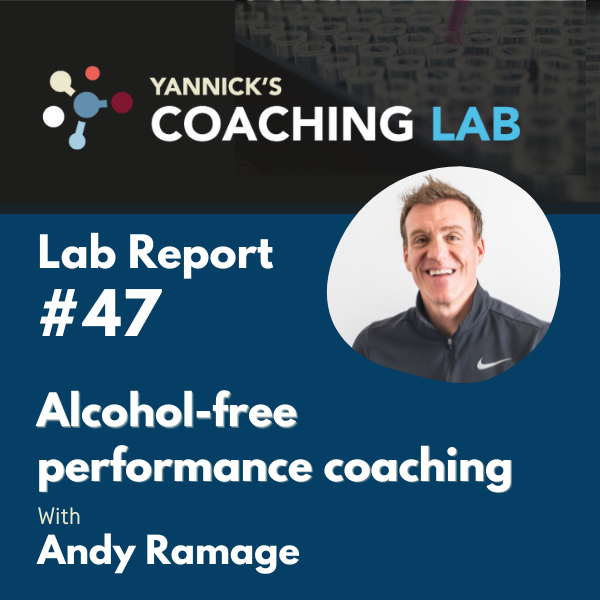
Yannick’s Coaching Lab features guest coaches from a broad variety of approaches, who showcase how they work as part of a live 45min coaching session, followed by reflections and Q&A with the audience.
Curious to know what this session was like? Have a peek at the Lab Report below or consider VIP membership to access the full recording of this and many more exciting sessions.
Yannick’s Coaching Lab #47 — Andy Ramage
Lab Report by Natalie Fraser
Session Summary
Andy’s client is looking to stop drinking again, with a question whether it would dbe possible for her to have a glass here and there, or whether she would need to drop it entirely. She had been alcohol-free for 3 years in the past and had enjoyed this experience. On a holiday last year, alcohol ‘crept back in’. They’re looking for Andy’s expertise to re-connect with their alcohol-free self. Andy made it clear that his approach is typical of behaviour-change coaching, which may be applied to other topics as well as alcohol. In this session, Andy dedicated the majority of time to using the ‘ambivalence see-saw’ exercise, combining drawing and writing, to create a visual overview of the benefits and consequences of drinking and not0drinking, providing a tangible tool for them to work together with. Important insights were revealed through this exercise and session, including the client recognizing that during sobriety she gains a deeper connection to herself, is more authentic, and comes alive as she recalls this. The session closed with some clear intentions for moving forward being identified and set.
Key Moments
Contracting – Andy always checks when working with the topic of alcohol that his client is in the ‘middle lane’ and it is safe to stop drinking, rather than someone who may identify as dependent. Setting the scene involved being clear about how long they have to work together today, and asking the client what they’d like to get from this experience.
Recapping – Andy summarized his client’s introduction to clarify he’d understood their situation, before asking about any particular themes.
The theme of Identity arose as a key area to explore, specifically related to being perceived as more “fun” when drinking. Over the session, the themes of identity and fun resurfaced and were reframed through Andy’s client’s reflection, establishing for example that her idea of ‘fun’ doesn’t have to be the same as other people’s idea of ‘fun’.
Ambivalence see-saw is ‘motivational interviewing’ in a tool. Both client and coach draw a very basic see-saw (a line and a triangle – left side higher/lighter than right side lower/heavier). 30 minutes allocated to this task. The aim is to create the same/similar drawing for each to have in front of them which becomes a tool to use for the session. Andy guided his client through a series of questions and explained where on the image to draw the answer, such as:
– What are the perceived benefits of alcohol? Noted on the left side – higher
– What are the consequences of alcohol? Noted on the right side – lower
The exercise drew out key themes which were related to the benefits and consequences of alcohol. This provided a tool for a reflective discussion expanding on the themes, especially bringing up negative memories related to alcohol times and positive memories related to alcohol-free times.
How would you feel in 6 months if you’d [made this behaviour change] become alcohol-free? Invited his client to picture how it will feel being sober in her future.
What needs to happen moving forward? Invited his client to remember some good advice about reading and immersing themselves in alcohol-free literature and podcasts. And any specific time?
What is your major take away from today’s session? Closed the session with a significant insight.
Insights & Take-Aways
The client found the writing these insights and themes down on a diagram was very helpful, and will continue to help her moving forward.
The ambivalence see-saw exercise is ‘staged’ in that it is purposefully swayed with a visual representation that gives more space to the benefits of sobriety. Also, the use of ‘perceived upsides of alcohol’ (whilst not using ‘perceived’ when discussing other things)
Motivational interviewing is very impactful with behavioral change coaching, especially when there is ambivalence.
Asking similar questions in different ways allows the insights to expand upon each other more and more.
A very important part of the training and chemistry session is about establishing whether the client is suitable for your competency. The use of an audit in the chemistry session establishes the client’s relationship with alcohol. Sign-posting to specialist professionals, and framing this as a benefit rather than ‘closing the door’ on the client is very important. Supervision is a fundamental part of coaching that Andy promotes.
Psycho-education clients about research into alcohol can at times be very valuable.
“not why the problem… why the pain?” Often engagement with alcohol was related to underlying challenges, which surface in later coaching sessions. Again, this is a point for supervision and checking in with one’s competency at skillset at a coach.
A list of all available recordings can be found at https://bit.ly/LabRecordings
This Lab Report was authored by Natalie Fraser
Natalie is an existential Counselling Psychologist, specialising in trauma and transformation, and curious about coaching. Interested in exploring life’s Big Questions? Find out more at: www.existentialofferings.com

